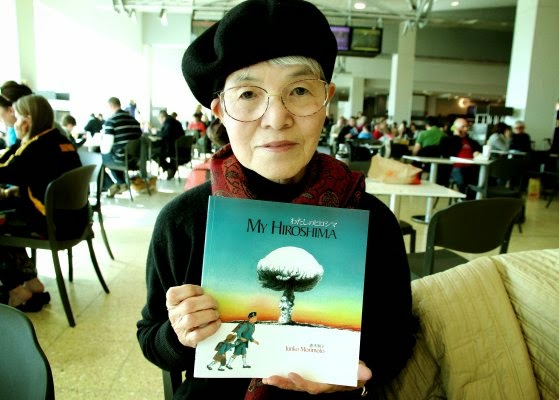 |
| Good Friday 2015 Walk for Justice in downtown Chicago: Remembering the 70th anniversary year of the atomic bombings of Hiroshima and Nagasaki by the United States. (Image courtesy FJJ.) |
Our new group participated in the April 3, 2015, Good Friday Justice Walk sponsored every year by the 8th Day Center for Justice in Chicago.
This year's theme was "Give Light and People Will Find the Way." We hosted Station 6: "Falling."
Below is our prayer, followed by references about the sources we used.
Reader 1: The 70th anniversary of the U.S. atomic bombing of Hiroshima and Nagasaki falls this year. Despite the facts of nuclear injury -- which are undisputed and taught in every school – we allow our government to maintain an arsenal of nuclear weapons on alert, capable of destroying the world at the flip of a switch.
Why do we allow this?
Is it that we don't know? Or that we are unwilling to see?
Response (all): Awaken our hearts. Give us hearts capable of seeing.
 |
| from Hiroshima No Pika |
Reader 2: "There were crowds of people fleeing the fire. Mii saw children with their clothes burned away, lips and eyelids swollen. They were like ghosts, wandering about, crying in weak voices. Some people, all their strength gone, fell face down on the ground, and others fell on top of them. There were heaps of people everywhere."
[p. 14, Hiroshima No Pika [The Flash of Hiroshima], by Toshi Maruki]
Response (all): We see you have fallen. We don't have the strength to lift you up. But we will not turn our backs on you.
Reader 3: "Every school became a hospital for the badly injured. I heard people screaming and moaning in pain, and there was a horrible smell of burnt skin."
[p. 24, My Hiroshima, by Junko Morimoto]
Response (all): We can hear you are in pain. We can smell your injuries. We don't have the power to restore your health. But we will NOT forget you.
 |
| Shin's Tricycle |
[p. 15-20, Shin's Tricycle, by Tatsuharu Kodama; Noriyuki Ando, ill. ]
Response (all): We will keep Shin's tricycle. We will remember Shin.
Reader 2: "Mii watched as her mother examined her father. 'He's hurt badly,' she said. She untied the sash from her kimono and wrapped it around her husband's body as a bandage. Then she did something amazing. She lifted him onto her back and, taking Mii by the hand, started running."
[p. 12, Hiroshima No Pika]
Response (people on the right): Who will lift us up?
Response (people on the left): We are living in the dust of the nuclear threat.
Response (all): Help us lift each other up, for we cannot rise alone from the dust.
Response (people on the right): How will we see the way?
Response (people on the left): The truth has been hidden by smoke and ash.
Response (all): Give light and people will find the way.
[p. 30, Shin's Tricycle]
Response (all): Thank you, Tatsuharu Kodama, for giving light. The people will find the way.
 |
| Junko Morimoto |
[afterward, My Hiroshima]
Response (all): Thank you, Junko Morimoto, for giving light. The people will find the way.
Reader 2: "Every year on August 6 the people of Hiroshima inscribe the names of loved ones who died because of the bomb on lanterns. The lanterns are lit and set adrift on the seven rivers that flow through Hiroshima. The rivers flow slowly to the sea, carrying the lanterns in memory of those who died."
[p. 44, Hiroshima No Pika]
Response (all): Thank you, people of Hiroshima, for giving light. The people will find the way.
 |
| Annual commemoration of the bombing of Hiroshima. |
About Hiroshima No Pika [The Flash of Hiroshima], by Toshi Maruki
Hiroshima No Pika on Amazon
Maruki Toshi (1912-2000) and Maruki Iri (1901-1995)
Maruki Gallery for the Hiroshima Panels
About Shin's Tricycle, by Tatsuharu Kodama (Noriyuki Ando, ill.)
Shin's Tricycle on Amazon
Shin's tricycle in the Hiroshima Peace Museum
About My Hiroshima, by Junko Morimoto
My Hiroshima on Amazon
"80 year old artist paints the horror of atomic bombing live"
No comments:
Post a Comment